Hearing loss happens when there’s a problem with one or more parts of the ear or the nerves from the ears to the brain. It can pop up at any age and often sneaks in slowly, so you might not notice it initially.
Statistics show that millions of people across the globe deal with hearing loss. According to the World Health Organization, around 466 million people have disabling hearing loss, and by 2050, this number could jump to over 900 million. That’s a lot of folks who can’t hear as well as they might like.
There are a bunch of things that can cause hearing loss.
Sometimes it’s genetic, and other times it comes from spending too much time around loud noises. Those concerts or blasting music sessions aren’t great for your ears. Infections, aging, and even some medications can also play a role.
If hearing loss is left unchecked, it can mess with your life big time. People might struggle to chat with friends or family, leading to misunderstandings and frustration. Social gatherings can get stressful, and it might even impact job performance. The emotional and psychological toll is real and shouldn’t be overlooked.
Getting a handle on hearing loss early can make all the difference. Regular check-ups with a doctor or audiologist are key. They can catch issues before they snowball and suggest steps to prevent further damage.
The Role of Medications in Managing Hearing Loss
When it comes to hearing loss, medications aren’t usually the first thing that comes to mind. But they play a sneaky role in ways you might not have thought about.
Medications can both protect and harm your hearing.

Certain meds can sometimes enhance your hearing by reducing swelling or inflammation in the ear. Others might be geared towards protecting your hearing if you’re dealing with specific health conditions.
The truth is, while no magic pill can restore hearing for everyone, medications can still be part of the strategy when it comes to managing hearing loss.
One big factor?
Understanding that medications for hearing loss have their limits. They’re not a one-size-fits-all fix and aren’t the silver bullet for those living with hearing difficulties. For some folks, medications might bring relief or contribute to a broader treatment plan. But the results can vary hugely from person to person.
Engaging with healthcare professionals is vital.
They’ll weigh up whether medications are right for you alongside other treatments and solutions. This customized approach ensures you get the most out of your management plan without putting your hearing at further risk.
Don’t forget the downsides.
Some medications can lead to hearing issues if not used properly.
Consulting with medical experts can keep you informed about potential side effects or interactions with other drugs you might be taking. As a pharmacist, if you need any help or advice with certain medications, just let me know in the comments section.
Recommended Reading: Best Hearing Exercises To Improve Listening Skills
Steroids in Hearing Loss Management
Corticosteroids, commonly known as steroids, can sometimes be game-changers when it comes to sudden hearing loss.
They work primarily by reducing inflammation and swelling in the ear, which can help improve hearing in some cases. (some of them include prednisone, methylprednisolone, and betamethasone)
These medications often come into play with sudden sensorineural hearing loss (SSHL), a condition that typically strikes with little warning. You can read more about the different types of hearing loss here.
Doctors might prescribe them to quickly address inflammation and potentially recover hearing. However, the timing of using steroids is crucial for effectiveness.
The evidence is a bit mixed, but some studies back up the use of corticosteroids, especially when they’re administered soon after the onset of hearing loss. They’ve shown promise in a considerable number of cases, providing a chance of partial or full hearing recovery.
But steroids aren’t without their drama.
Potential side effects include weight gain, mood swings, and high blood pressure, among others. Weigh this against the benefits before diving into a steroid regimen.
It’s all about talking to your doctor. They can help decide if steroids are worth it for your situation, considering your medical history and other treatments you might be considering.
Vasodilators and Hearing Loss
Vasodilators might sound fancy, but they’re essentially meds that help widen blood vessels, improving blood flow.
In terms of hearing, better blood flow can mean a healthier ear environment, potentially aiding in the management of some types of hearing loss.
These medications sometimes get a nod when hearing issues are linked to blood circulation problems in the ear. Conditions like Meniere’s disease, which comes with symptoms like vertigo and hearing loss, might see some improvement with vasodilators.
There’s a bit of science behind it.

Some studies suggest that by increasing blood flow, vasodilators can help with the health of the inner ear cells and the repair of damaged tissues. However, it’s not a cure-all remedy, and results can be hit or miss.
Experts often highlight the importance of monitoring potential side effects, such as low blood pressure or headaches. This is where the expertise of a medical professional shines – they can tailor treatment plans to minimize risks and maximize benefits.
Patient experiences vary.
Some folks find relief from symptoms of hearing loss with these meds, while others may not notice a significant change.
If you’re considering this option, it’s all about balance and ongoing dialogue with your healthcare team.
Antibiotics and Antiviral Medications
Infections are notorious for meddling with hearing. When an ear infection strikes or your body grapples with a virus, hearing loss can be a side effect.
Antibiotics are on the front line for bacterial ear infections. Taking the right antibiotic at the right time can help clear the infection, which may, in turn, help restore hearing.
It’s paramount to ensure you’ve got the right diagnosis. Antibiotics won’t work on viral infections, and their unnecessary use can contribute to the growing issue of antibiotic resistance.
Antivirals step up when viruses are at play, like in cases of sudden hearing loss related to viral infections such as herpes simplex. These medications aim to control the viral load in your body, potentially averting further damage to your hearing.
Examples of infections that cause hearing trouble include otitis media, labyrinthitis, and even some less common viral outbreaks. Each comes with its own set of challenges and treatment approaches.
Understanding when antibiotics and antivirals make sense is crucial. This is yet another reason to have a solid relationship with your healthcare provider, who can tailor the right plan for you and keep your hearing as intact as possible.
Emerging Drug Therapies For Hearing Loss
The world of medicine isn’t static, especially in the hearing department. Emerging drug therapies might hold promise for folks dealing with hearing loss.

Research is churning out innovative treatments that are still in the testing phase. Some of these are aimed at regenerating hair cells in the cochlea, which are critical for translating sound waves into nerve signals. This kind of breakthrough could be huge.
Clinical trials are an exciting frontier.
They help us understand what’s possible with these new medications. Success cases are starting to pop up, though it’s still early days.
Stories of triumph and setbacks weave through these trials. While some drugs move closer to approval, others face challenges that send scientists back to the drawing board.
The hope tied to these advancements fuels optimism in the audiology field. Researchers and healthcare professionals are committed to turning these theories into real-world treatments.
Keeping an ear out for updates in medical news can be beneficial
If you or someone you know has hearing loss, being informed can help in making proactive choices about emerging treatments.
Combining Medications with Other Hearing Loss Treatments
Medications aren’t standalone heroes in most hearing loss journeys. They can be a part of a bigger picture—that’s where combining treatments comes in.
In my case when I suffered from Menieres disease along with that crazy Tinnitus, the doctor gave me a combination drug course to complete.
It consisted of betahistine, prednisone, and valaciclovir
Hearing aids are often the first tool audiologists recommend. They amplify sounds, bridging gaps that hearing loss creates. When paired with the right medications, they can work together to give a more comprehensive solution.
These days, you can try out several OTC rechargeable hearing aids like the Jabra Enhance Select 500, or the MACH 2 Pro Wireless.
Other therapies, like cochlear implants, might come into play for those with more severe hearing loss.
Again, these might be more effective when combined with medical treatments, possibly accelerating adjustment and effectiveness.
It’s not just about the ears, but the whole lifestyle too.
Maintaining a balanced lifestyle, avoiding loud noises, and following medical advice can bolster the effects of both medications and electronic devices.
Seeking advice from audiologists and other specialists can guide decisions.
They provide a roadmap that considers the whole person—hearing, lifestyle, and everything in between.
What have you tried that helps with your hearing loss? Share your experience below.
Looking forward to hearing from you.
Regards and Take Care
Roopesh

This article has been incredibly helpful in understanding the role of medications in managing hearing loss.I know quite a few people who have have some form of hearing loss.
I have a question about the long-term effects of using medications for hearing loss. Are there any potential risks or side effects associated with prolonged use? Also, are there any natural or lifestyle changes that can complement medication therapy? Thanks for the informative article!”
I’m glad you found the article helpful! To answer your questions:
When it comes to the long-term use of medications for hearing loss, it really depends on the type of medication being used. Some medications, like steroids, may be prescribed short-term to reduce inflammation in cases of sudden hearing loss, but they aren’t typically used long-term. Prolonged use of certain medications, particularly those known as ototoxic drugs (e.g., some antibiotics, chemotherapy drugs), can potentially worsen hearing over time. It’s always important to discuss any concerns with your healthcare provider.
As for natural or lifestyle changes, absolutely! Protecting your ears from loud noises, maintaining a healthy diet rich in vitamins (like magnesium, folate, and vitamins A, C, and E), and staying physically active can all help support hearing health. Some studies suggest that antioxidants and anti-inflammatory diets may reduce the risk of further hearing damage. Managing stress levels and staying hydrated also play a role in overall ear health.
Thanks again for your thoughtful comment, and I hope this helps! Let me know if you have any other questions. 😊